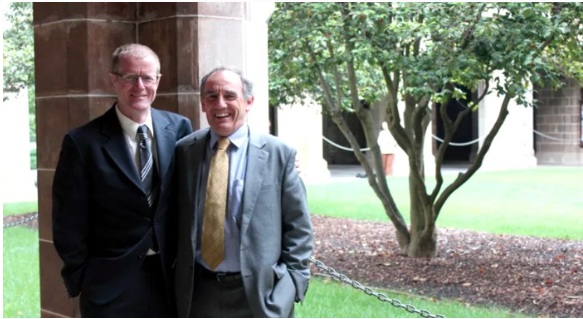From strength to strength: Victoria’s entrenched status as biomedical research hub

Two of Victoria’s leading research minds have received the state’s highest scientific honour for research into how the immune system identifies and fights disease, a high-water mark for careers that have worked in sync over 15 years of technical innovation.
Monash University NHMRC Fellow Jamie Rossjohn and University of Melbourne Deputy Vice-Chancellor (Research) Jim McCluskey received the Victoria Prize for Science and Innovation from Victorian Small Business, Innovation and Trade Minister Philip Dalidakis at a ceremony in Melbourne last night.
It celebrates a long partnership that has, among many finds, led to a pioneering understanding of how T lymphocytes from the immune system recognise harmful microbes.
Their research could assist the treatment of inflammatory bowel disease, peptic ulcers, tuberculosis and lead to better vaccines and diagnostic tools.
Mr Dalidakis said the honour is further evidence of Victoria’s claim as Australia’s premier biomedical research hub.
“Not only is our state home to a world class critical mass of creativity and brainpower, we have an unparalleled suite of cutting-edge research institutes and facilities, technology platforms and data centres that creates an unparalleled medical research ecosystem,” Mr Dalidakis said.
In a collaboration that stretches back 15 years, the research cooperation between Professors Rossjohn and McCluskey mirrors the technological evolution of Victoria’s biomedical research sector.
Professor McCluskey said the decades of vision and commitment by the Victorian State Government has paid dividends that will continue to be realised.
“When I completed my PhD in 1994, the computing power was a fraction of that of the smartphone now in my pocket," Professor Rossjohn said.
"It took essentially the entire duration of a PhD to determine a protein structure but now, fortunately, with the advancement of technologies, research progress in this vital area of biomedical science can be much more rapid.
“The investment in the Australian Synchrotron by the Victorian Government has really propelled our research,.
“Prior to 2008, we used to collect data in overseas synchrotrons. The facilities overseas were great, but very limiting in terms of access: it was very hard to be internationally competitive until the Synchrotron came along.”
Professors Rossjohn and McCluskey said their success is concomitant with significant investments in infrastructure from Monash and Melbourne Universities along with the State of Victoria.
“The University of Melbourne has invested in state of the art flow cytometry facilities and other platform technologies in the Doherty Institute and Bio21 Institute,” Professor McCluskey said.
“While Monash has invested in sophisticated imaging platforms, including crystallization robotics forming part of the Monash Biomedicine Discovery Institute.
“Across our state the combination of clinicians, medical researchers, cutting-edge laboratories, biomedical companies and landmark research infrastructure provides, an amazing and seamless network of moving parts dedicated to finding new and better ways of treating the diseases that affect so many Victorians."
As well as being a recipient of a prize, Professor McCluskey took time to congratulate new and emerging researchers from a range of areas who were awarded Victoria Prizes for Life Sciences and Physical Sciences.
"I congratulate all of those researchers from the University of Melbourne and our partner institutes who have been recognised in the 2016 Victoria Prizes," he said.
"This night rightly celebrates the importance of innovation and globally impactful work being completed at institutions across the State. And while I am both excited and humbled to receive the 2016 Victoria Prize, I am equally as proud that I get to share this years awards with so many of our academic community’s top researchers."
Ms Paola Vaz from the University of Melbourne Faculty of Veterinary and Agricultural Sciences will undertake her study mission at the University of Bonn, in Germany, to conduct specialised functional tests on newly-discovered proteins from marsupial herpesviruses.
This will improve our understanding of how they use such proteins to infect and cause disease, which could lead to improved diagnostics tools, vaccines or anti-viral treatments.
Ms Vaz will also visit research institutions in Chile and Colombia to test tissue samples of unique and rarely studied South American marsupials for herpesviruses, to gain a greater insight into viral evolution and spread.
PhD candidate Ms Sarah Baines is enrolled through the Department of Microbiology & Immunology at the Doherty Institute. Her study mission will take her to the University of Bath, in England, and the Pasteur Institute, in France, to acquire specialised skills to identify bacterial genetic predictors of disease and explore the evolution and spread of drug-resistant S. aureus in Australia. Ms Baines will also attend the Gordon Research Conference on Staphylococcal Diseases, in the US.
Dr George Chen from the Melbourne School of Engineering will visit a pilot scale testing facility at the University of Surrey, in England where he will evaluate the application of a highly energy efficient membrane technology, called forward osmosis, to reduce the energy consumption of the concentration and drying processes for the manufacture of dairy powder products. This is an important innovation for the Australian dairy industry.
Dr Hamish McWilliam, based at the Doherty Institute, in the Department of Microbiology and Immunology will undertake a study mission to the Rockefeller University, in the US, to enable Dr McWilliam to acquire the technical skills to monitor protein trafficking in cells and understand how foreign molecules from bacteria are imported into human cells and presented to the immune system. This information is vital for developing specialist drugs that can boost immunity to life-threatening infections.